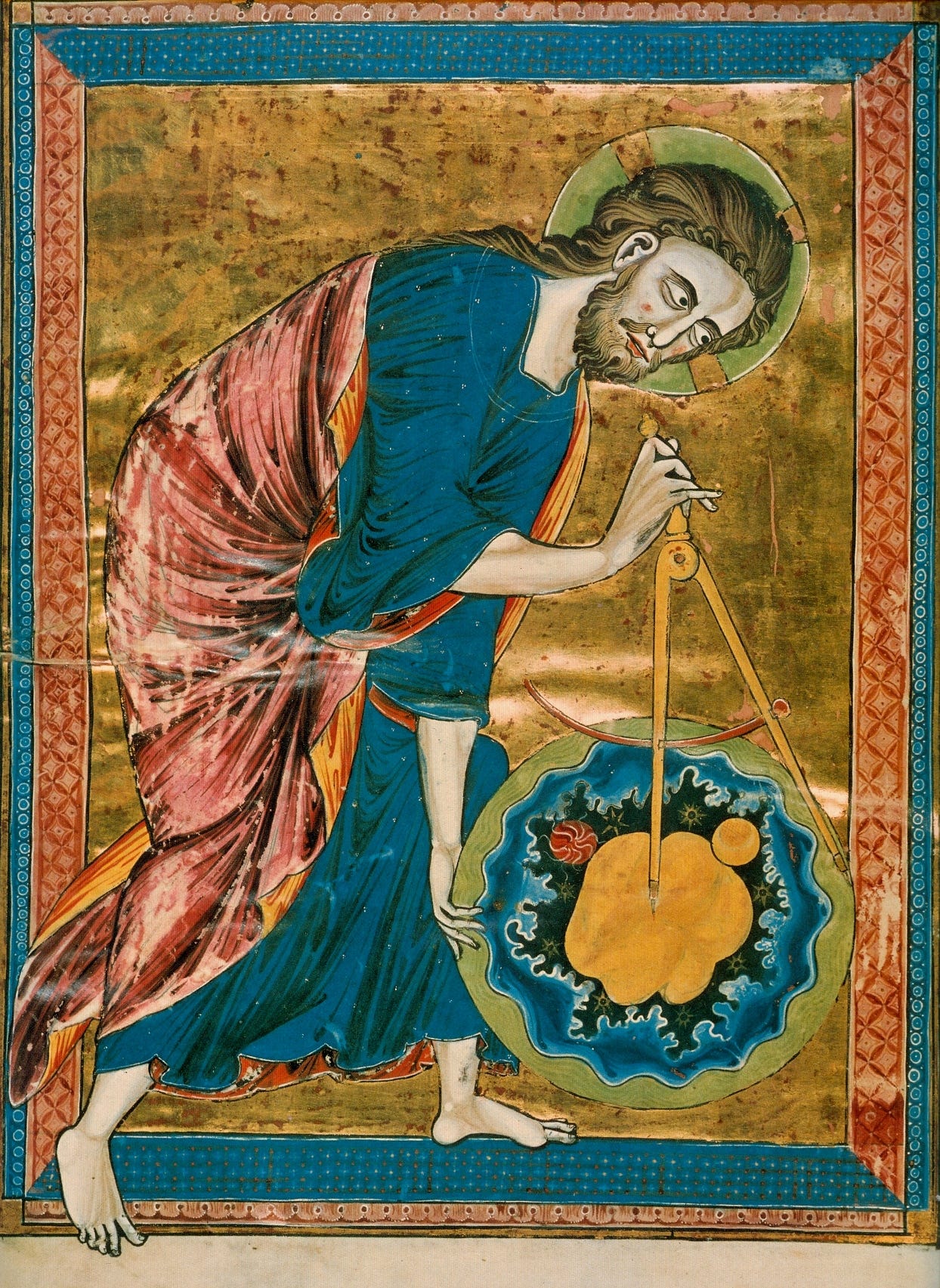In what way is Jesus "the Word"?
Jesus as the structure of the universe
One of the stranger claims of Christianity is that Jesus is the "Word" of God. Jesus is (somehow) simultaneously God and man and also the Word, or the Logos.
John 1:1-3 (RSV) says:
In the beginning was the Word, and the Word was with God, and the Word was God. He was in the beginning with God; all things were made through him, and without him was not anything made that was made.
What do we mean when we say that Jesus is the Word?
John’s words here, which open his testimony about Jesus, call back to Genesis 1:1. “In the beginning God created the heavens and the earth.” In Genesis 1, God made the world through speech. God created by saying, “let there be ____" and then that thing came into being. The words of God went out and actually made things exist. Genesis shows us a Creator God who is so transcendent, so above and beyond his creation, that he doesn't even need to physically interact with his cosmos in order to make it. He simply speaks, and things become what they are.
And yet, the fact that God created through speech also shows his immanence in creation. Speech is intimate. In one sense our words are a part of us, an extension of our being. Our speech flows straight from our mind and heart; you can tell a lot about a person just by listening to her. Just as our words reveal our thoughts and heart, God’s words show who God is.
Our words go out into the world: they vibrate the air and cause neurological pathways to reconfigure in the brains of those who hear us. People respond to our words. They are encouraged or hurt or confused. Like God, we form worlds with our words.
Our words go out from us and then cease. But God’s words go on forever. When God speaks, the sound waves don’t die out so that he must repeat himself. The speech that caused all things to begin can still be heard. In fact, God’s speech can still be seen and touched and experienced; God’s speech is everything that exists. (Psalm 19)
Ancient philosophers were deeply preoccupied with understanding and describing the structure of the universe. For Plato, everything we see is derivative of some greater reality. The greater reality is the world of the forms, and what we see around us are "images" of the forms. The images are less real, the forms are more real. Ultimately the most perfect reality is mathematics, pure form unhindered by imperfect matter.
The Stoics believed that Mind pervades all of the universe the way our soul fills every part of our body. Philo agreed, and identified this “Mind” as the Logos, the “Form of Forms”, the firstborn of God. The Logos was divine but was also present in every part of the cosmos, giving it structure and order and form.
Non-Western philosophers also imagined the world ordered by an offspring of God who was the structuring principle of everything:
The way is empty, yet use will not drain it.
Deep it is like the ancestor of the myriad creatures.
Blunt the sharpness;
Untangle the knots;
Soften the glare;
Let your wheels move only along old ruts.
Darkly visible, it only seems as if it were there. I know not whose son it is. It images the forefather of God.
—Lao Tzu (4) trans. D.C. Lau
Early Christians had likely not read Lao Tzu, so they were not working with his conceptual palatte. But we can imagine how excited the writers of the New Testament would have been to find these descriptions of “the way” which so closely echo the ancient Greek philosophers’ understanding of the Logos.
The claim of Christianity is that this tau, this Mind, this Form of Forms, is identical to the creative word God spoke at the beginning, and that this Word is Jesus.
The first Christians called themselves followers of “the Way.” Their religious practice was to imitate the Logos, and that meant understanding the nature of reality and acting accordingly. Until Jesus appeared in the world, mankind only saw God indirectly: they saw God’s work in nature and reasoned about what God must be like. But when Jesus came, mankind saw God’s face. Contemporaries of Jesus saw his physical face, but two thousand years later, we see God’s face spiritually when we hear Jesus’ words, meditate on his actions, and become more like him.
Jesus is the perfect Image of God, the Form of Forms in a human form. Because all things were made through and by and for him, only Jesus can perfectly demonstrate how humans are to act so they can uphold the order and beauty of the universe. Mankind failed to do this, becoming unworthy “images”, and losing their status as sons of God. But Jesus came to restore all things to the Father.
As we follow and imitate Jesus, we are restored to our original design and to our office as God’s images. As restored images, it is our job in turn to restore the world to its original design. As we follow and imitate Jesus the Logos, we ourselves become “Little Logoi.”




Brilliant! I’d love to know how you define “little” logos?